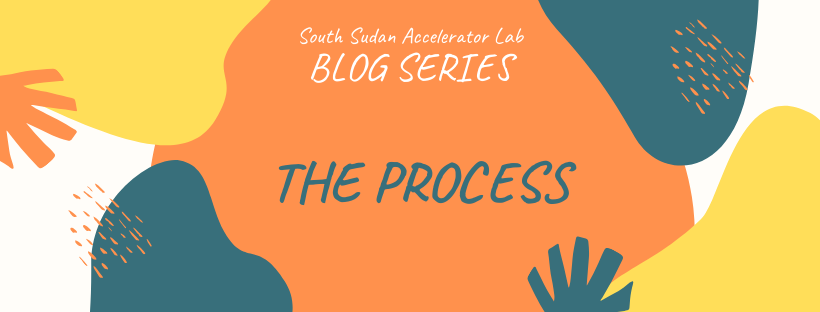The Process

Learning Loops: How does the Accelerator Lab work in South Sudan?
The South Sudan Accelerator Lab is part of the global Accelerator Lab (AccLab) Network, launched by the United Nations Development Programme as the “largest learning network dedicated to accelerating outcomes for sustainable development”. In South Sudan, we’re harnessing the power of the global network and the ingenuity of local solutions to tackle the issue of youth unemployment and empowerment.
To that end our new AccLab uses new-ish approaches to push the boundaries of how we think, how we work, and how we engage. We call our approaches, our “protocols” and they are: sense-making, collective intelligence, solutions mapping and experimentation.
Sense-making…what is really going on?
The challenge of youth disenfranchisement in South Sudan is intractable and driven by multiple factors. The multi-dimensionality of the issue has made it incredibly difficult for different actors working on this issue to “zoom in” on effective and efficient solutions. In fact, there are currently many donor-funded youth programs operating across South Sudan with competing theories of change. These programs lack coordination and a common narrative that ties them together.
The AccLab firmly believes that the protocol of sense-making would help us collectively improve impact on this key challenge by enabling different responders (NGOs, INGOs, government and development partners) to have a clear, deep and unified understanding of the current and future challenges and opportunities within the local context of the youth agenda. This would help determine where the responders would need to focus their attention in order to move beyond perennially pilot initiatives.
Experimentation…how do you know what works?
We live in a complex world with many problems that require humanitarian, peacekeeping and development interventions. Organizations, governments and individuals are under extreme pressure to use resources efficiently and eliminate potential wastage. To that end, responders need to know what solutions work and how impact is being made.
The AccLab is resourced to conduct a series of experiments to push the boundaries of what’s possible, test and figure out what works and share scalable findings with a broader ecosystem. This will help our partner organizations shorten their learning loops. As such the experimentation process would enable the ecosystem players quickly home in on what interventions work and which ones don’t work – and shortening this cycle to months instead of years or decades.
Collective intelligence…from silos to an ecosystem
Many responders operating across the value chain of the youth agenda in South Sudan are working in silos. They each design and implement divergent approaches to the problems affecting the youth. Such an approach fails to create a systematic approach or passes by synergies which could unlock exponential, instead of incremental, progress on the issue.
Our hunch is this current siloed approach is driven by the absence of a comprehensive and collective analysis on the youth challenge. Part of this is driven by a significant gap in updated demographic information, youth data, youth mapping and/or youth organizational mapping. In order to adapt, many organizations have initiated their own assessments, surveys and data collection – often on a smaller scale due to limited resources.
Many organizations in this space do not realize which studies or data other actors have compiled on this ad-hoc basis. As such, the AccLab is seeking to breakdown these existing silos by bring the different players together to attempt to reach a common understanding of the existing data and information available, the gaps, and the opportunities to pursue breakthroughs – all through what we are calling a “Collective Intelligence Summit”.
Our goal is champion this approach in South Sudan to encourage knowledge sharing between the different entities who play key roles in addressing the needs of youth. We recognize there will be challenges associated with attempting to push the collective towards open data approaches, but we think it would help the entire ecosystem to better understand and develop higher-quality solutions/interventions that address this important challenge.

 Locations
Locations